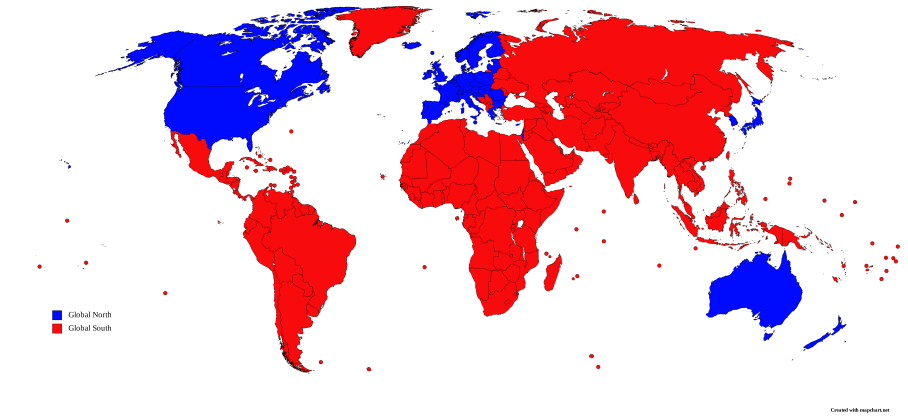
In geopolitics, the Global South is a general term that roughly designates the economically exploited countries. In contrast, the Global North encompasses the most advanced capitalist countries,[1] whose wealth was largely stolen capital generated from colonialism and their modern involvement in imperialism.[2] "Global south" is separate from, but not mutually exclusive, to the reality of settler-colonialism as some global south countries can also be settler-colonial.
To be a global south country is to be a country whose economy was suppressed under the historical conditions of imperialism. The Marxist usage of the "global south" follows the line used by AES countries like China according to the Marxist understanding of global imperialism. China is considered to be part of the South, despite them soon achieving the highest GDP in the world. Israel is considered to be part of the Global North, due to its establishment by and advancing the imperial interests of the Global North.
The term Third world is also sometimes used to talk about the Global South, but this word is considered outdated. The term "developing countries" is misleading, as it ignores the fact that the "developed" countries are the ones imperializing them: overexploiting and making them economically dependent on export/imports from or to the global north.[2]
In 1500, the average income in Europe was only three times higher than in Africa and Asia, but that difference grew to ten times by 1960.[3] In addition, in 1960, the richest 20 countries were 18 times as rich as the 20 poorest countries in terms of GDP per capita. This ratio grew to 37 times in 1995.[4]
References
- ↑ IGI Global Publisher Dictionary, "What is Global North/South?"
- ↑ 2.0 2.1 LENIN; Vladimir, Imperialism: The Highest Stage of Capitalism (Read on Marxists.org)
- ↑ Vijay Prashad (2008). The Darker Nations: A People's History of the Third World: 'Buenos Aires' (p. 66). [PDF] The New Press. ISBN 9781595583420 [LG]
- ↑ Vijay Prashad (2008). The Darker Nations: A People's History of the Third World: 'Conclusion' (p. 277). [PDF] The New Press. ISBN 9781595583420 [LG]